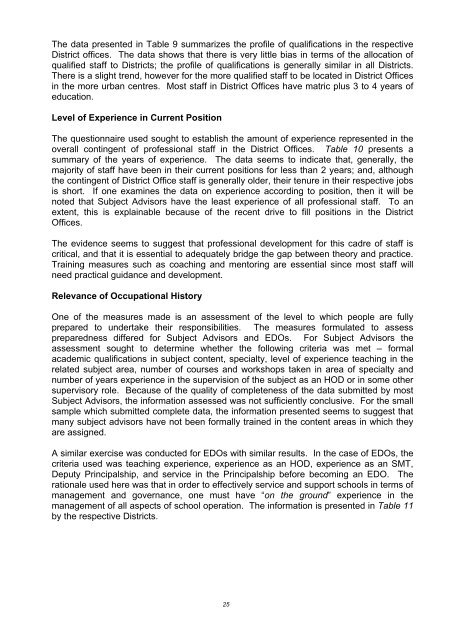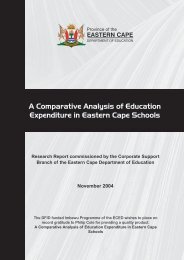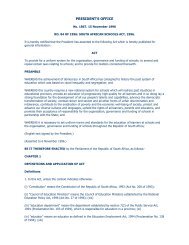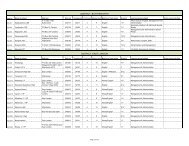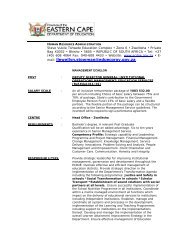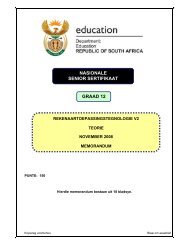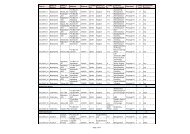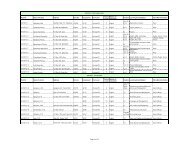Assessment of Needs and Capacity of District Office Professional Staff
Assessment of Needs and Capacity of District Office Professional Staff
Assessment of Needs and Capacity of District Office Professional Staff
Create successful ePaper yourself
Turn your PDF publications into a flip-book with our unique Google optimized e-Paper software.
The data presented in Table 9 summarizes the pr<strong>of</strong>ile <strong>of</strong> qualifications in the respective<br />
<strong>District</strong> <strong>of</strong>fices. The data shows that there is very little bias in terms <strong>of</strong> the allocation <strong>of</strong><br />
qualified staff to <strong>District</strong>s; the pr<strong>of</strong>ile <strong>of</strong> qualifications is generally similar in all <strong>District</strong>s.<br />
There is a slight trend, however for the more qualified staff to be located in <strong>District</strong> <strong>Office</strong>s<br />
in the more urban centres. Most staff in <strong>District</strong> <strong>Office</strong>s have matric plus 3 to 4 years <strong>of</strong><br />
education.<br />
Level <strong>of</strong> Experience in Current Position<br />
The questionnaire used sought to establish the amount <strong>of</strong> experience represented in the<br />
overall contingent <strong>of</strong> pr<strong>of</strong>essional staff in the <strong>District</strong> <strong>Office</strong>s. Table 10 presents a<br />
summary <strong>of</strong> the years <strong>of</strong> experience. The data seems to indicate that, generally, the<br />
majority <strong>of</strong> staff have been in their current positions for less than 2 years; <strong>and</strong>, although<br />
the contingent <strong>of</strong> <strong>District</strong> <strong>Office</strong> staff is generally older, their tenure in their respective jobs<br />
is short. If one examines the data on experience according to position, then it will be<br />
noted that Subject Advisors have the least experience <strong>of</strong> all pr<strong>of</strong>essional staff. To an<br />
extent, this is explainable because <strong>of</strong> the recent drive to fill positions in the <strong>District</strong><br />
<strong>Office</strong>s.<br />
The evidence seems to suggest that pr<strong>of</strong>essional development for this cadre <strong>of</strong> staff is<br />
critical, <strong>and</strong> that it is essential to adequately bridge the gap between theory <strong>and</strong> practice.<br />
Training measures such as coaching <strong>and</strong> mentoring are essential since most staff will<br />
need practical guidance <strong>and</strong> development.<br />
Relevance <strong>of</strong> Occupational History<br />
One <strong>of</strong> the measures made is an assessment <strong>of</strong> the level to which people are fully<br />
prepared to undertake their responsibilities. The measures formulated to assess<br />
preparedness differed for Subject Advisors <strong>and</strong> EDOs. For Subject Advisors the<br />
assessment sought to determine whether the following criteria was met – formal<br />
academic qualifications in subject content, specialty, level <strong>of</strong> experience teaching in the<br />
related subject area, number <strong>of</strong> courses <strong>and</strong> workshops taken in area <strong>of</strong> specialty <strong>and</strong><br />
number <strong>of</strong> years experience in the supervision <strong>of</strong> the subject as an HOD or in some other<br />
supervisory role. Because <strong>of</strong> the quality <strong>of</strong> completeness <strong>of</strong> the data submitted by most<br />
Subject Advisors, the information assessed was not sufficiently conclusive. For the small<br />
sample which submitted complete data, the information presented seems to suggest that<br />
many subject advisors have not been formally trained in the content areas in which they<br />
are assigned.<br />
A similar exercise was conducted for EDOs with similar results. In the case <strong>of</strong> EDOs, the<br />
criteria used was teaching experience, experience as an HOD, experience as an SMT,<br />
Deputy Principalship, <strong>and</strong> service in the Principalship before becoming an EDO. The<br />
rationale used here was that in order to effectively service <strong>and</strong> support schools in terms <strong>of</strong><br />
management <strong>and</strong> governance, one must have “on the ground” experience in the<br />
management <strong>of</strong> all aspects <strong>of</strong> school operation. The information is presented in Table 11<br />
by the respective <strong>District</strong>s.<br />
25


